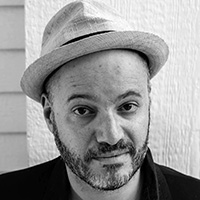Maggie Nelson is one of our greatest poets and essayists. Among her nine books, her lyric essay Bluets is a cult classic among MFA students, her essay collection The Art of Cruelty looks at the darkest and most disturbing images of art and does not flinch, and her book The Red Parts is a disturbing cold case—investigating, in graphic and stunning detail, the 1969 murder of her aunt.
Now, in The Argonauts, she has written a family memoir, but this poet of sublime intensity and violence has not gone suburban on us. In the first paragraph, it’s clear that this may be about a family, but it is not family viewing: “…the words I love you come tumbling out of my mouth in an incantation the first time you fuck me in the ass, my face smashed against the cement floor of your dank and charming bachelor pad. You had Molloy by your bedside and a pile of cocks in a shadowy unused shower stall. Does it get any better? What’s your pleasure? you asked, then stuck around for an answer.”
You had me at anal sex, dildos, and a Beckett novel. What’s next? She falls in love with an artist and doesn’t know what pronoun to use. The artist Harry Dodge was born Harriet Dodge and was still in the midst of making the surgical transition to the male pronoun. In the midst of the indeterminacy, we experience the life of the mind, the body, the artist, the poet, and finally, a baby boy, who emerges in a graphic and wrenching birth, one that stretches the body and the heart. “The woman with such access and excess is the sodomitical mother,” Nelson writes. Nelson gives us an account of eros and progeny like none other. She spoke to us in Los Angeles, where she is a professor in the School of Critical Studies at Cal Arts.
What is the central conflict of this book?
Well, the book begins with a debate my partner Harry [Dodge] and I had about language, about what can be understood and expressed through language, and what can’t. The book pairs this question with a meandering but pointed examination of issues of gender, sexuality, and embodied experience. People say that experiences like giving birth or dying are things that language can’t approximate or touch. Well, I thought, true enough, but that doesn’t mean you shouldn’t write about them, so I tried.
It seems like the book is designed to subvert certain assumptions about gender and sexuality. It’s also a book about ideas. And you name the thinker to whom you’re indebted to in the margin.
That’s a methodology directly stolen from Roland Barthes. It’s really a way of fast-tracking. I’m always trying to figure out quicker ways of dealing with sources. It was a way I could get them out of the main text.
Do you find that when you’re writing prose you’re writing prose poetry? The aphorisms that you use in this book and others make it closer to the compression of language in a poem.
I started off as a poet. My first two books were poetry, so it’s always in me, but I don’t really think about genre. I’m just trying to get the sentence to sound right. When people talk about poetic prose, I think they mean that things are pretty or something. But if I’m thinking of something pretty, I’m way off track. I do think that compression is a feature of my writing style. I’m not a baroque writer. It’s not Hemingway, but it’s rinsed. I think of this book as more anecdotal than aphoristic. There might be aphorisms contained in these chunks, but, at least for me, the controlling factor of this book had more to do with the anecdote than anything quippy.
You quote Wittgenstein: “The inexpressible is contained, inexpressibly, in the expressed.”
It’s great, right? Every book I write, I’m just trying to give a forum for Wittgensteinian quotations I love.
How would you unpack that for people who don’t know Wittgenstein?
It has both a linguistic dimension and a spiritual dimension. It’s about how articulation summons all that is not articulated; you could also imagine it as leaving space for God.
I loved the way you used that.
Some writers get into the trap of trying to express the inexpressible, or worrying about ruining the inexpressible with language, or the wrong language. Don’t worry. It’s all there. By making marks, you are invoking what is outside of the marks you make, so the sayable is not necessarily as anemic as you might think. The unseen and inexpressible are always with you in what you write. Recently some students of mine, when discussing this concept, gave me a completely different context for “leaving a space for God.” They said that when they had high school dances, they were told to “leave space for Jesus,” meaning, not to dance too close to each other. I was super amused by that. That’s not how I meant it at all. When I talked about leaving a space for divinity to rush in, I didn’t mean creating an invisible chastity belt. It’s more like asking: why do you pray? Why do you need silence? These are aesthetic questions as much as spiritual ones. Think of John Cage’s “4:33,” for example—all space.
Mingus told Joni Mitchell that he wanted to leave a grace note for God.
That’s lovely. I wrote a lot about space in The Art of Cruelty. It became the book’s strongest subtext. And about Cage, about the difference between a kind of Artaud-like desire to batter and overwhelm the audience with a spectacle vs. the desire to empty out the space of the spectacle and listen. That dichotomy runs throughout The Art of Cruelty. For me, the space of criticism is not silence, but it is a kind of pause, away from the din of culture or the Internet or manic production. Like everybody else, I find reading and writing to be harder and harder to do because there’s no incomingness about it. It sits with itself. There’s no bing! The screen does not refresh, there is no meaningless hit of dopamine delivered from someone outside. You’re alone with your ideas. It’s a time outside of time.
You’re a creative writer, you’re a poet, you’re a critic, you’re an essayist. How do these various identities come together in this book?
The book does a lot of reckoning with things that I read 15-20 years ago, in addition to current texts. I don’t know if I’m grown up, but in some sense it’s a grown-up’s look back at the teachers that she has been lucky enough to have. Some people erase the traces of how they became the thinkers they became, because they think there’s something shameful or embarrassing about being a student. I wanted this book to shamelessly dramatize its construction of chosen family. I am who I am from having angled myself towards these people. If you want to read something that’s hyper-up-to-date with what’s happening now in queer theory, this probably isn’t that book. In academia, you’re not supposed to announce your ignorance, which is one of the reasons why I stand outside of it. I am glaringly aware of the massiveness of what I don’t know.

There’s always a blind spot.
Yes.
All this must relate to your title.
Yeah. I don’t know how you thought of it.
Well, I know there’s a Greek myth…
…not my main concern…
I figured.
It refers to Roland Barthes’s definition of the Argonauts in RB by RB. I wanted the title to be plural because it’s partly about my tribe, people with bodies. I wanted to gesture toward the people who went on this voyage with me, or whose voyage I stowed away on.






